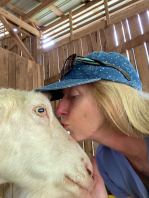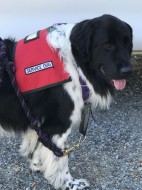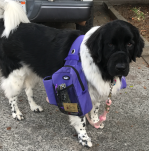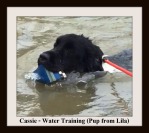Rocky Valley Farm Contract and Health Guarantee
Health Issues of a Newfoundland
This glossary will help to educate you, a potential Newfoundland owner, about the various
health problems that are common in the breed. While this glossary is not all encompassing, it provides general information. Our goal is to reduce the rate at which these issues appear and of course
desire to eliminate them all together. While we can not guarantee 100% clear our goal of introducing old world genetics is to improve in all of these areas. We are seeing a greatly improved success
rate at this time.
|
Orthopedic |
Heart |
Eyes |
Miscellaneous |
|
Hip or Elbow Dysplasia |
Congenital (SAS) |
Ectropion / Entropion |
Cystinuria |
|
Elbow anomaly |
Non-Congenital (DCM) |
Cataracts |
Allergies |
|
Osteochondritis Dessicans (OCD) |
|
|
Hypothyroidism |
|
Ruptured Cruciate Ligament |
|
|
Bloat |
❊ Orthopedic surgeries, including plating/pinning of fractures and cruciate ligament repair
❊ Laser surgery
❊ Laser therapy for orthopedic conditions
❊ Ultrasound
❊ Oncology (Cancer treatment), including chemotherapy
❊ Ophthalmologic diagnostics and treatment
❊ Electrocardiograms (EKG), echocardiograms (heart ultrasound) and cardiology consultation services with board certified cardiologists
Rocky Valley Farms's Veterinarian is a 3rd generation vet and graduated from one of the top schools in the country, and provides us with the absolute best care for your puppy. We provide full vaccination per the current Animal Hospital Association’s Canine Vaccination guidelines.
Current Vaccine Guidelines
The guidelines divide vaccines into two categories - core and non-core.
Core vaccines are considered vital to all dogs based on risk of exposure, severity of disease or transmissibility to humans. Canine parvovirus, distemper, canine hepatitis and rabies are considered core vaccines by the Task Force.
Parvovirus is rampant across the United States. It is in the soil and once there can last years. Even with vaccination puppies are at risk. It is advised to keep them isolated until a full series can be administered. Even then there is no guarantee so being mindful of where you take your pet in these early months is crucial.
Non-core vaccines are given depending on the dog’s exposure risk. These include vaccines against Bordetella bronchiseptica, Borrelia burgdorferi and Leptospira bacteria.
Worming
This growth phase of their life is when they are most susceptible!
Deworm at 2, 4, 6, & 8 weeks of age, then again at 12 & 16 weeks of age.
You can then move to 6 months and 1 year, then deworm as an adult.
Rocky Valley Farm Guarantee 2022 Website[...]
Adobe Acrobat document [405.5 KB]















